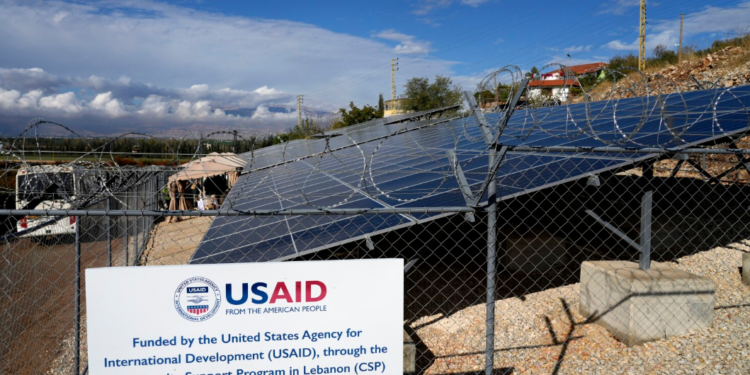Feb 4, 2025 Story by: Editor
JOHANNESBURG (AP) — Just days after President Donald Trump signed an executive order freezing nearly all U.S. foreign aid, Claris Madhuku, based in rural Zimbabwe, received an email that confirmed his worst fears: “Stop all activities immediately.”
For Madhuku, the directive signaled the potential collapse of his organization’s mission to protect African girls from child marriages.
Many Africans anticipated that Trump’s “America First” policy would deprioritize their continent, but few expected such an abrupt halt in funding from the world’s largest donor. The freeze has put a hold on financial support for essential programs, including disease response, girls’ education, and free school meal initiatives.
Despite global backlash leading to limited exemptions from Trump’s order, sub-Saharan Africa is poised to bear the brunt of the freeze, with most foreign aid paused for 90 days for a spending review. Last year alone, the U.S. provided the region with over $6.5 billion in humanitarian assistance.
For Madhuku and many others, the damage is already significant. His organization, Platform For Youth and Community Development, is among hundreds of grassroots non-governmental organizations in Africa that rely on U.S. aid to carry out life-changing work.
With funding cut off, his team of approximately 100 volunteers can no longer receive stipends for food and transportation, which are critical for their outreach programs aimed at keeping girls in school and preventing early marriages.
“We had to stop everything, no warning, no time to adjust,” Madhuku said. “I appreciate that Trump might have some justification in trying to account for American taxpayers’ money … but it has caused disaster here.”
Concerns Over PEPFAR, a Lifesaving HIV/AIDS Program
Trump’s foreign aid freeze has raised alarm about the fate of the President’s Emergency Plan for AIDS Relief (PEPFAR), a widely praised global health initiative. Over the past two decades, PEPFAR has received bipartisan support and has been credited with saving more than 25 million lives, primarily in Africa.
“The world is baffled,” said South African Health Minister Aaron Motsoaledi in response to the U.S. aid freeze.
South Africa, which has the highest number of people living with HIV, depends heavily on PEPFAR, with U.S. funding covering nearly 20% of its $2.3 billion annual HIV/AIDS budget. PEPFAR’s support is crucial in providing life-saving antiretroviral treatment to 5.5 million South Africans each day.
HIV Patients Left Without Care
Following the aid freeze, U.S. Secretary of State Marco Rubio announced exemptions for programs providing “life-saving” assistance, including medical services, food, and shelter. However, the scope of these exemptions remains unclear.
According to the United Nations AIDS program (UNAIDS), many PEPFAR-funded organizations have already shut down due to the funding pause, creating a “lack of clarity and great uncertainty about the future.” PEPFAR currently supports HIV treatment for over 20 million people worldwide.
In Johannesburg and other cities, PEPFAR-funded clinics remained closed days after the exemptions were announced, forcing HIV patients to seek treatment at government-run hospitals and clinics.
At the HIVSA center in Soweto, two staff members were seen turning patients away. Meanwhile, a notice posted at the renowned Wits RHI Key Populations Clinic, which serves both adults and children living with HIV, read: “We apologize for the inconvenience this causes.”
The Dangerous Consequences of Aid Delays
Experts warn that disruptions to HIV treatment could have deadly consequences.
“We need to know a lot more before we can say people won’t die directly because of the pause to funding,” said Charles Kenny, a senior fellow at the Center for Global Development in Washington. He explained that while antiretroviral drugs may be covered under exemptions, the diagnostic tests needed to direct treatment could be affected.
“HIV viral loads rebound in about three weeks if you go off antiretrovirals,” Kenny warned, emphasizing the risks of even short interruptions in treatment.
Despite the exemptions, uncertainty remains about which U.S.-funded programs will be allowed to continue.
The Trump administration has restricted USAID staff and contractors from discussing the situation publicly without high-level approval, further complicating efforts to assess the impact of the aid freeze. Many humanitarian organizations fear that speaking out could lead to permanent funding cuts.
Aid Suspension in Conflict Zones Increases Risk of Disease and Starvation
A humanitarian official speaking to The Associated Press on condition of anonymity revealed that at least 1.2 million people in Congo may lose life-saving assistance due to the aid freeze. Nearly half of the official’s organization’s funding comes from USAID, and more than $100 million designated for humanitarian programs in over 30 countries has been halted.
The freeze comes at a critical moment in eastern Congo, where escalating violence has already displaced millions, and outbreaks of the mpox virus were declared a global health emergency last year.
In war-torn Sudan, where cholera, malaria, and measles continue to spread, the funding halt puts 600,000 people at heightened risk of contracting and transmitting these diseases, according to the humanitarian official.
Even though the Trump administration has stated that exemptions exist for life-saving aid, humanitarian groups have been instructed not to resume USAID-funded activities until they receive official confirmation that the waivers apply to them. Source: Bakersfield

















